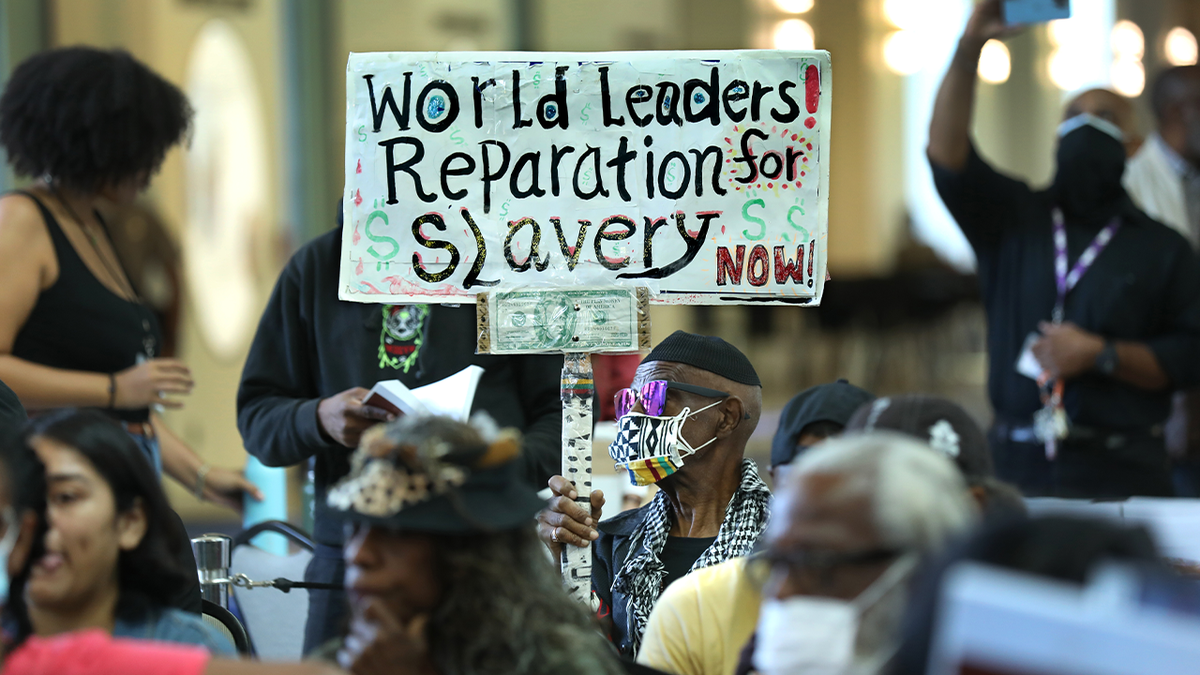Boston reparations task force member looks to 'reconcile, repair' areas of education, health, wealth gaps
Boston Reparations Task Force member L’Merchie Frazier told Fox News Digital that the examination of the history of slavery practices in the U.S. could lead to 'real dollars.'
People are not satisfied with the San Francisco city government’s progress in providing reparations to descendants of African Americans who have suffered historical discrimination, according to a new report.
Although a city government panel proposed monetary reparations for eligible Black residents last year – with some potentially receiving $5 million, "So far, all they’ve received is an apology," The Washington Post reported.
The Post detailed how the city has had to cut funding for the project, and that people are growing frustrated over the lack of progress on reparations.

Critics are worried that San Franciscos government will not do enough to provide reparations for descendants of Black residents. (Carolyn Cole / Los Angeles Times )
The San Francisco Board of Supervisors put out an official apology last month – an eight-page resolution that stated, "The San Francisco Board of Supervisors offers its deepest apologies to all African Americans and their descendants who came to San Francisco and were victims of systemic and structural discrimination, institutionalize racism, targeted acts of violence, and atrocities."
As the paper noted, this is "the first step to addressing more than 100 recommendations outlined by the city’s African American Reparations Advisory Committee," though locals – including legal scholars, told The Post they don’t believe it is nearly enough.
University of San Diego Law professor Roy Brooks has been critical of the progress so far.
"Saying sorry or apologizing is not enough," he said. "You need a redemptive act to make the rhetoric of remorse believable."
Members of the board like Dean Preston have acknowledged that the apology cannot be "an end in and of itself," the board has run into "harsh economic realities" while pursuing further solutions, the piece stated.
The Post explained how the budget set aside for a government Office of Reparations, which the Reparations Advisory Committee advised be created, was gutted in Mayor London Breed’s $75 million "midyear budget cuts."
Without the office, the San Francisco Human Rights Commission is now tasked with completing the advisory committee’s proposals and has prioritized over a dozen reparations-based projects, including "creating satellite offices of Historically Black Colleges and Universities in the city" according to the commission executive director Sheryl Evans Davis.
NEWSOM FALLS SILENT AFTER CALLS FOR HIM TO TAKE EXECUTIVE ACTION ON REPARATIONS

San Francisco Mayor London Breed recently announced budget cuts that gutted the city's proposed Office of Reparations. (Justin Sullivan/Getty Images)
In addition to financial barriers, Davis admitted that monetary reparations proposals, including $5 million payments, may run into legal barriers as well.
"But it could be challenged under California’s 1996 proposition 209, which eliminated affirmative action in the public sphere," The Washington Post reported, quoting Davis, who added, "There are some things that we would not be able to advance."
The potential stall here has not been sitting well with Stephen Hanlon, a lawyer representing Black descendants of those victimized by the Rosewood massacre, an incident in Florida around a century ago "where a Black community of about 100 people was destroyed by a White mob after a White woman accused a Black man there of attacking her," the outlet explained.
In an email to The Post, Hanlon pointed to then-Florida Gov. Lawton Chiles signing a bill in 1994 to compensate the incident’s survivors, with each getting $150,000 each and some getting college scholarships.
He pointed out that Chiles did not give an official apology but focused on providing compensation, suggesting that San Francisco seemed to be doing the opposite.
CLICK HERE TO GET THE FOX NEWS APP
"We did not seek an apology from the state because we believed that if we did, that might be all we would get," Hanlon said. "It was very important to our clients that the state pay money for what it had done to the Rosewood family in 1923."










































